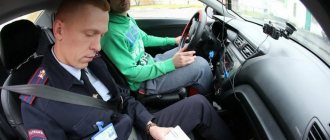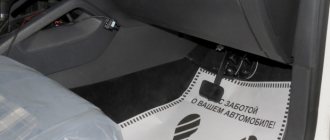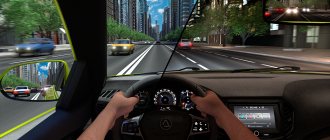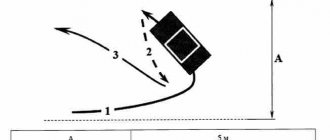traffic police
28.08.2018
4 comments
69232
An exam is always a holiday, I remember, said one hero of a well-known old Soviet film. Is it really? Almost anyone will say that, of course, this is not true. This is exciting, scary, this terrible tension until you shake in your hands. Especially if it is a traffic police exam. There are lucky people who are calm and unperturbed in any situation, like a rock. Or they are so confident in their knowledge and skills that they see no point in worrying. However, most will still need simple tips on how not to worry before the traffic police exam.
What is this exam and what is it eaten with?
In order not to be afraid of the exam, you need to know well what it is. When preparing at a driving school, they will tell you this many times, explain it to you, and give examples. In addition, before day X you will have to pass a similar test within the walls of your home school - an internal exam. Can you repeat roughly the same thing again? For sure.
Actually, the exam consists of two parts: theoretical and practical. In the first one you will have to answer questions about tickets. Knowledge of traffic rules and driving theory will be tested. The practical part of the exam, in turn, is divided into two parts. The first involves an exam on a racing track - testing the ability to perform a standard set of exercises. The second includes driving in the city.
To get a consultation
Dispelling myths about the practical part of the traffic police exam
Many future motorists hear dozens of myths that it is generally impossible to pass the exam on their own and on the first try. Not only is this possible, but more than half of the initial applicants for a driver's license do just that. Even if you fail the first attempt, you can take two more. Successful passing of the theory will be counted the first time; you will not have to retake it.
Myths that relate to the practical part of the exam are less sophisticated than in the case of theory. People love to scare themselves and believe all sorts of scary stories about obviously incorrect tickets and computers infected with viruses at the traffic police. The practical exam also has a certain set of horror stories, which often become an element of the applicant’s fear when taking it:
- the inspector may demand a bribe in a hidden form, constantly sending for a retake;
- No one ever passes their license the first time, especially in practice;
- Each inspector has a plan that cannot be violated - everyone must go for a retake;
- often the traffic police officer provokes by asking questions that cannot be answered;
- policemen like to ask what sign you passed three kilometers ago;
- The person taking the practical part of the exam is skeptical about your skills and can easily fail.
Any of these myths can ruin your mood during the practical part of the exam. We hasten to please those who are soon going to become the proud owner of a license - there are millions of drivers in the country, and only a small proportion of them encountered problems when passing the practical exam. There is indeed a human factor here, but inspectors are often friendly and willing to give you an o.
As for corruption, it was present ten years ago. Today, the system for obtaining rights is completely transparent; bribery is excluded here. The inspector may indeed ask you what signs you passed, but only within the limits of those signs that are in effect on that particular section of the road. And any driver should notice this.
Of course, most fears and uncertain driving situations arise in women. Watch the following videos for more information on overcoming these fears:
To drink or not to drink, that is the question?
Many tips on how to calm down before a traffic police exam include a recommendation to take a sedative.
However, such drugs inhibit attentiveness, reaction speed and speed of thinking, making a person overly lethargic and relaxed. Do you need it for your driving test? Hardly. In addition, excessive relaxation can be dangerous not only for the success of the exam, but also for other road users. But the day before you can relax and get a good night's sleep. But you can resort to pills only as a last resort: they can cause lethargy the next day. It is better to drink tea with chamomile, mint or lemon balm, warm milk with honey, take a bath with foam and lavender essential oil, and get a massage. And go to bed early.
Important! Some people are used to relaxing before bed with a glass of beer or wine. On the eve of an exam, this is the worst thing you can think of. After all, alcohol will lead to a slow reaction the next day, and may not completely disappear from the body.
How to prepare for the practical part of the driving test?
All training at a driving school is designed to prepare you not only for successfully passing the test, but also for driving in real life. You need to make the most of practical and theoretical classes, because after receiving your license you will have neither the time nor the desire to study with an instructor. Therefore, you need to pay special attention to the methods of your studies.
Simply spending the allotted time with an instructor and skating the required number of hours is great, but these efforts are often not enough to get the desired results. Ask questions, be interested in the psychological aspects of passing the practical part. You will be trained in classes by an experienced driver who has trained hundreds of people and can give practical advice. You need to do the following:
- If there are any unclear aspects, immediately clarify them with a specialist;
- while driving, give all your attention to getting used to driving;
- use all the opportunities for additional classes, but only in a legal field;
- If necessary, take additional classes with an instructor to analyze problems;
- use various simulators and other tools to improve your skills;
- develop an understanding of the road, learn to read road signs and markings;
- Always apply the acquired theoretical knowledge to practical training.
The theory course often does not give a complete idea of how to apply this or that rule in real life. Therefore, you need to understand that after theoretical training, what lies ahead is a rather complex process of applying theory to practice. To get the maximum result, you will even need to relearn some points, clarifying their true meaning with the instructor.
There is no room for embarrassment when learning. If you have trouble remembering to turn off the turn signal every time after completing a maneuver, be sure to tell your instructor about it. He will be able to find the necessary recommendations and develop your ability to remember such important details. These are the factors that determine whether you will pass your license the first time or not.
I love - I don’t love
Some people love to practice parallel parking, but hate hills. Others prefer the snake... This is about the basic exercises. Often cadets make a common mistake: they try to avoid exercises they don’t like, paying more attention to their favorite ones. As a result, the former remain poorly developed. How can you not worry during your driving test?
After all, no one will ask what we like and what we don’t. You will have to pass all the exercises, and equally well. And to do this, you need to practice all the exercises on the race track equally hard, so that you can literally go through them with your eyes closed.
If there are any particularly weak points, be it in theory or practice, then it is worth tightening them so that they fly off your teeth. And this is the most effective way not to worry during the traffic police exam. After all, only impeccable preparation will help you be confident in your knowledge and strengths.
DAY BEFORE THE EXAM
Understand your nervous state
A state of nervousness is the body’s reaction to danger. This condition changes the biological balance in the body, which causes a short-term increase in physical and mental strength, which is designed to ensure that a person either runs away from danger or is able to fight it and emerge victorious. Nervousness will help you, but only if your anxiety doesn't get out of control. We remind you that our psychologist Ekaterina will help advise you if necessary.
Beware of stress (keep your eyes open)
Don't ignore your anxiety about the exam. Many factors can combine to create stress, and then you will not be able to cope with your anxiety. Therefore, try to deal with all problems one by one, as they arise, and then stress will not arise, or at least you will be able to manage it. All the worries associated with the test are superimposed on the stresses of everyday life - keep them all under control and you will find that you can cope with the driving test.
Eat right
Eating a balanced diet of natural and healthy foods will help your body cope with stress more easily. Too much sugar or caffeine will only increase stress if it catches you off guard. But still eat chocolate. Even though chocolate contains a lot of sugar, the other ingredients it contains are known to have a calming effect. Suddenly switching to a different diet a few days before an exam can have a negative impact on your stress tolerance and ability to cope with the exam.
Normalize your sleep
Take time to relax and rest the night before the exam. If you manage to get a good night's sleep, your concentration levels will improve. If the upcoming exam day still keeps you stressed and anxious, try taking a hot bath or listening to some soothing music before going to bed. If you cannot sleep peacefully, do not try to fight this condition. Don't try to force yourself to sleep. Trying stubbornly to fall asleep and avoid a sleepless night has the opposite effect: falling asleep becomes increasingly difficult, and the next morning you feel tired and exhausted. Meanwhile, it is quite normal for your sleep on the eve of the upcoming exam to be restless and shallow, so take it calmly, anticipate this possibility and try to find ways to minimize the influence of various irritants that prevent you from falling asleep (light, noise, thoughts). A glass of warm milk may help; milk has a calming effect.
Don't fool your body
You may think that pills are a good way to calm your nerves, but pills can weaken your concentration and slow your reactions. Drinking the evening before an exam for the purpose of relaxation will also not help the next day. Moreover, there may still be alcohol left in your body, and you will appear for the exam with this. Your body should be fresh and alert and certainly not loaded with medications or, even worse, traces of yesterday's booze.
Avoid smoking
Some people smoke to relieve stress. Instead, your blood pressure may rise and your anxiety may also increase. Control your habits, but don't change them before exams. Choose a different time to quit smoking.
Believe in yourself
You can do it! You were seriously nervous about it, but you know how to drive a car. Think about a couple of particularly good lessons you've had recently and then enjoy imagining demonstrating your skills to a skeptical examiner.
Remind yourself that you have already taken other exams.
A driving test is a test like any other. You have already taken and passed much more difficult exams. Don't forget this.
Remember, the examiner is also a person
They understand that you are nervous. They know that the exam is of great importance to you. Within reason, they will make an adjustment (discount, leniency) for this, unless, of course, your nervousness is a threat to safety.
Meditate
During the week before your scheduled exam, find 5 free minutes every day, sit in a quiet place, close your eyes and be transported in your imagination to the beach, where the waves wash your feet and the sun warms your body. This will help relieve pre-exam anxiety.
Relax
Muscle tension caused by stress can be relieved through exercise, as well as a simple technique of tensing the entire body and then relaxing the muscles. Stress will gradually weaken and leave you.
Use breathing exercises
If you are very anxious before a pre-scheduled exam day, use breathing practice. It's simple: take a deep breath, hold it for a second, then exhale. Repeat the exercise several times, and then focus all your attention only on your breathing. This will help you clear your mind of unnecessary thoughts and worries. In addition, your heart rate will stabilize.
Don't listen to bad advisers. And talk less
If you chat at every turn about the upcoming exam and the accompanying worries, then every listener - with good intentions, of course - will strive to give advice. And not always good. And, most likely, contradicting other advice.
And also, especially for those who have already attended a driving school and received a license, they will probably tell you how it was for them. How an evil inspector almost killed you in the parking lot. Or how you came across such a complex ticket that no one has ever sorted out.
Having heard enough of this, how not to worry before the traffic police exam? Hence the conclusion: talk less about your experiences and listen less. It will be calmer this way. Then tell the whole world how you successfully passed the exam - the first time!
THE MORNING OF THE DAY OF THE EXAM
Have a positive attitude towards life
Start the day with a positive thought, tell yourself that you are having a wonderful day when you take the exam, that you will definitely pass it, and in the evening you will have a party for this occasion.
Get ready
Take a shower, eat something, a hearty breakfast will help your concentration. Many candidates drink energy drinks and pop pills to compensate for lack of sleep. But higher doses of caffeine will not provide you with the same mental clarity as a good night's sleep will. Keep in mind that it is recommended to drink 2 cups of coffee to combat fatigue, but no amount of artificial stimulant will be as effective as healthy, natural sleep.
Do a mental rehearsal
Take a moment to sit in a quiet corner and mentally rehearse possible scenarios. Imagine the picture: You are driving in a car, moving smoothly and confidently. Imagine that you are relaxed and attentively listening to the examiner’s instructions, while at the same time concentrating on the road and other road users around you.
Imagine a picture of the future
One day you will become a completely experienced driver. You will drive a car every day without thinking at all about how you do it. You will turn on the radio, fix your hair while looking in the mirror, talk on the hands-free phone, in short: you will already have acquired a full package of all those bad habits that an experienced driver can have. Try to imagine yourself as such an experienced and confident driver. Now take that confidence with you to the exam.
Feel your nerves and accept a little nervousness
A little nervousness won’t hurt; on the contrary, it will be some optimal amount of adrenaline that will enhance your concentration and composure. Don't be afraid of this feeling, accept it and use it for your own benefit. Strong anxiety that turns into stress is dangerous.
Be rational
After all, you are not taking an exam on rocketry control. Millions of people have already successfully passed the driving test, the same one that you have yet to take. For all these people, the exam was just as important as it was for you, and they all managed to pass it, so go for it: it's actually not as scary as you think.
Visualize Success
Experiments have shown that students advised by our driving experts who visualize their success are more likely to actually succeed in their tests. However, most students, when worried, visualize failure, failure, and... sometimes fail.
Choose a comfortable style of clothing and shoes
Not a single examiner will give you a positive mark for your beautiful dress (suit) and good taste in fashionable clothes. So think about comfort and practicality rather than fashion. For driving a car, shoes with flat soles or low heels are most practical. If your shoes are so wide that it is difficult for you to press the brake pedal without hitting some other pedal, or if there is something else in the “design” of the shoe that prevents you from moving your foot freely from one pedal to another, you will have problems .
Make sure you bring everything you need with you
You will need documents to take the exam. First of all, this is your passport. As for other documents that you are required to have with you, your instructor can remind you of them. You don't want to be late for the exam, do you? Then put on your watch. The exam administration system will not adapt to your irresponsibility. Therefore, make sure to arrive at the exam center on time and with all the necessary documents.
Life doesn't end
And the easiest way to calm down before the traffic police exam is to just... calm down. Just ask yourself the question, what will happen if you don’t pass it? That's right, you will have one more try. And further. But generally speaking, life does not end with such a small failure.
Therefore, how not to worry during the driving test? Tune in for the best, calm down, pull yourself together. Of course, it’s easier said than done, but it’s still possible. How to pull yourself together? There are some simple recommendations:
- Think through and imagine everything in advance down to the smallest detail. Imagine how you, with a calm smile, relaxed, get into the car and fasten your seat belt. And so on.
- Remember your most successful, successful day, when you were more confident than ever. Close your eyes, remember as many details and little things of this day as possible. Feel your feelings at this moment. And try to fix this feeling of confidence in your soul.
- Think about the fact that the traffic police officer taking the exam is just a person. He, like everyone else, goes to bed and eats, communicates with family and friends, walks the dog, and goes to the store. It has its weaknesses and shortcomings. Realizing this greatly relieves fear.
Or else, remember that you have already had exams in your life, and probably more than one. You defended your diploma and graduated from school. And the Unified State Examination will be even worse!
***
And yet, how not to worry? What could be worse than passing the traffic police exam, someone will say. Whatever. To get lost in the forest. Move to live in another country. For some, even visiting the dentist’s office. And the exam is just another stage on the path of life. And you shouldn’t be afraid of it any more than you would be afraid of an ordinary little test. The main thing is that the result is worth it.
To get a consultation
Share on social networks:
More useful on the topic
How to properly start a manual vehicle: step-by-step instructions for beginners
23.05.2021
How to properly adjust the side and interior mirrors of a car yourself
08.04.2021
Tips for passing the practical exam
To minimize the likelihood of mistakes during the exam and to feel more confident on the road, you need to practice a lot. In addition to classes at a driving school, it will be useful to practice in empty, safe areas with relatives or friends who have a car and a license. If you know that parking is your weak point, then pay more attention to it. Otherwise, you will inevitably make a mistake in the exam.
It’s good if the exam route is known in advance. It’s worth driving along it several times, paying attention to signs, markings, traffic lights and any little things that a traffic police inspector might get caught on. Consider a few more important nuances necessary to successfully pass the city exam:
- do not take a lot of things with you, only the essentials;
- try to be one of the first to pass the test - this way you won’t have to worry for long and there will be no risk that they won’t have time to accept you;
- listen carefully and comply with all the inspector’s requests;
- Before starting the car, ensure yourself a comfortable position - adjust the seat, mirrors, seat height;
- fasten your seat belt;
- turn on the low beam and remove the car from the handbrake.
Taking sedatives the day before or during the test is highly undesirable. Sedatives slow down the reaction. Before Day X, get a good rest and sleep - this is the best alternative to any medications. Don't skip classes and don't hope for luck. Remember, even if you manage to fool the inspector and “miracle” pass the exam, when you get behind the wheel next time, you are endangering all road users.










